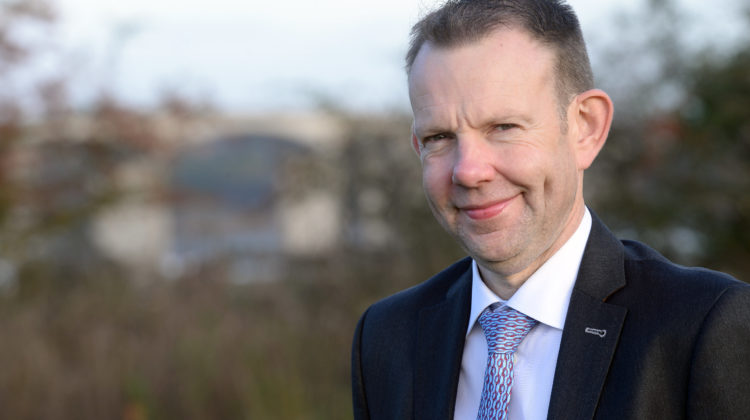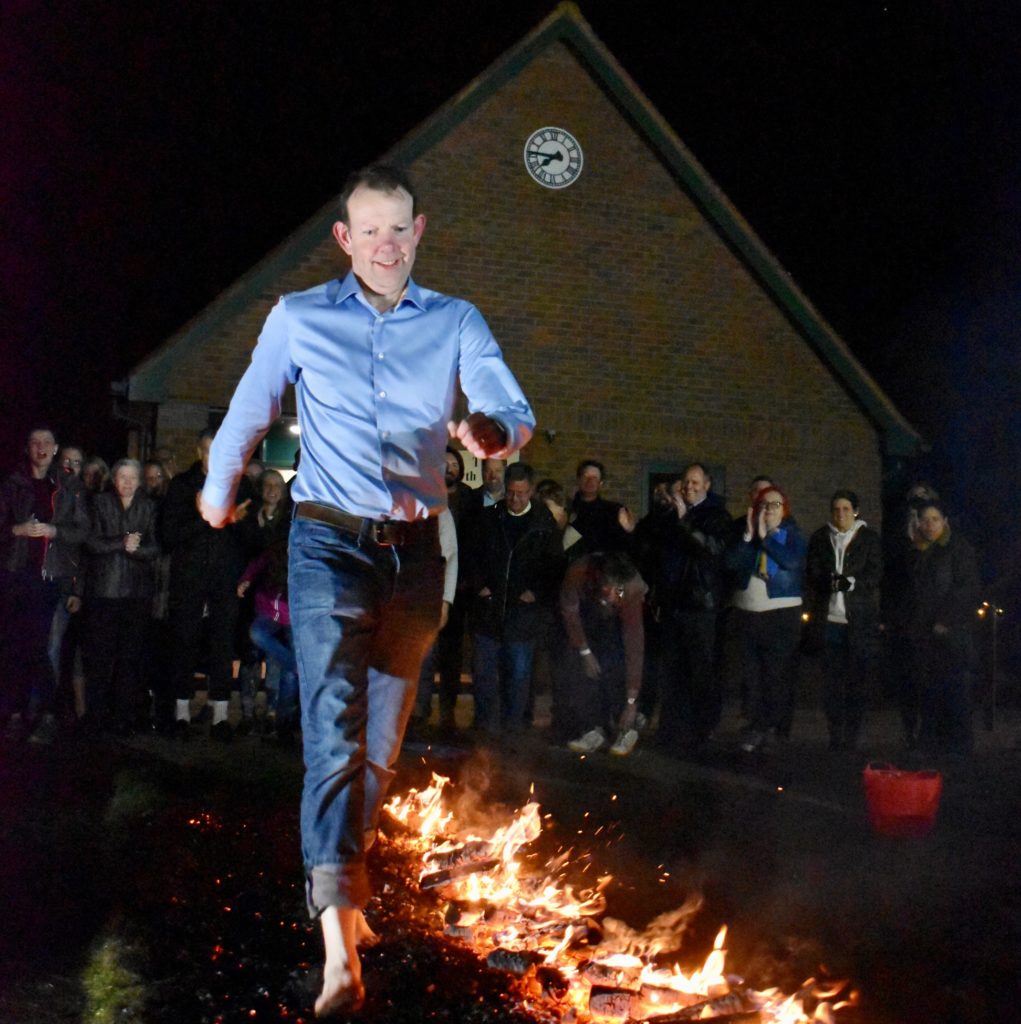
Doug Field, the joint CEO of East of England Co-op, was honoured with an OBE in the New Year. Here he talks about protecting key workers and customers alike and why eating the same lunch every day works for him
When Doug Field and two of his children did a fire walk for Suffolk Mind back in February of last year, little did he realise that that would be the last time he would be surrounded by so many people for quite some time. The joint CEO of the East of England Co-op had suggested the fire walk after James Finch, the then Chair of Suffolk County Council, had completed 10 walks for Suffolk MIND as his nominated charity for 2019/20.
‘I said that I’d always wanted to do a fire walk,’ says Doug, ‘and that I’d love for my kids to do a fire walk. He thought I was mad!’ Doug has two boys, aged eight and 11 and his eldest is on the autistic spectrum, so getting him on board was quite an achievement.
‘He doesn’t like to try new things and one of my personal drivers was getting him to do it and he loved it – they both did it. His sons then said: ‘can we have a fire walking birthday party!’’ That has yet to happen, but Doug, who also has a four-year-old daughter, says: ‘It was good to know they enjoyed it.’

Doug is not an East Anglian as such – he’s from East Yorkshire originally – and he says: ‘I ended up here by pure accident. I live on the Essex/Suffolk border, my wife is from Colchester. We met when I was living near Milton Keynes.’ There was some forward thinking behind the move. ‘We wanted free babysitting.’
A financial controller by profession, when he got the interview at East of England Coop, the largest independent retailer in the region, he admits: ‘I didn’t know anything about the Coop – it was quite embarrassing actually.’ However, as he adds: ‘It’s the longest job I’ve ever had. I’ve really bought into the values, the principles and the way of doing business.’
The Co-op way is thatthe members and local community share in its success. And it’s Doug’s job to oversee the finances of the business and the technology infrastructure – from PCs to till points.
At the start of last year, from a financial point of view, everything was ‘on target – everything was going well.’ Then, in the first few weeks of the pandemic, they saw a double-digit uplift in sales, with panic buying clearing the supply chain of certain items. ‘With our food stores we saw the impact on the front line,’ says Doug. ‘There was a big spike in people panic buying.’
Known for its Pop to the Coop slogan, people weren’t exactly being encouraged to pop to the shops too often, once lockdown kicked in. ‘The spend was going up, but the number of transactions was going down.’
Last year was the year that supermarket workers were among those recognised as key workers, on the front line of supplying essential goods to the public. Quite a responsibility for an employer? ‘Health and safety and wellbeing have always been important – at the top of our agenda,’ says Doug. They invested hundreds of thousands of pounds into measures to keep both colleagues and customers safe, including the installation of screens at all till points, and providing gloves, hand sanitiser and face coverings for colleagues.
One of the tenets of the Coop is the importance of community. And last year it became ‘absolutely vital,’ says Doug. ‘We created our Community Care Fund as part of our response, we help people and we asked people to donate their dividend to that. We’ve targeted people impacted though domestic violence and food poverty.’ The fund was set up in April, pretty soon after lockdown was imposed. Although he regards the word ‘pivot’ as ‘an awful business term,’ he says: ‘We all had to adapt.’
He thinks there has had to be a big shift in the mindset of big supermarket retailers. ‘I think the days of just competing with each other for profit are long gone. It’s people before profit.’
And it’s also made us all sit up and think about ‘how we value the key workers. You realise how under-valued they are, socially and financially. Those people in the NHS are fantastic.’
It’s been a time when nothing much else has really mattered. ‘We were all worried about food and health.’
So how did he deal with lockdown on a personal level? ‘I’m in a fortunate position where I live. We are not in London and we have access to green spaces.’
‘One of my big things is I like to learn. And one of the things I’ve learnt over the last five or six years, especially raising children, is about being more resilient. I know I need to exercise and I know I need to eat right – all these things are much more to the fore.’
At the risk of sounding ‘boring’, Doug admits: ‘I have the same lunch at work: wild rice, beetroot, avocado and tuna. You can prepare it Sunday night and it’s done for the week.’
Although he’s at pains to add: ‘I’m not Mark Zuckerberg – I don’t wear the same clothes every day – but I do realise I have my little quirks.’
Demand for locally sourced food and drink has soared in recent months, with sales of their Sourced Locally given a boost. It probably goes without saying that both the funeral services and travel services businesses within East of England Co-op has been impacted by the pandemic. Doug is aware that people might be ‘desperate’ to go on holiday. ‘We live on an island. We are cooped up in our own homes. I quite fancy Norway, but we’ve got a dog.’ The Field family will be holidaying in this country when they get a chance to this year.
Up until recently, Doug was the chair of the New Anglia Local Enterprise Partnership. He stepped down at the AGM in September. ‘I’d been on the LEP board for just under six years and was chair for three years.’
Doug wanted to get businesses more involved, during his tenure. ‘It’s meant to be a business led organisation.’ And there was something he learnt whilst he was chair: ‘You need to appreciate the impact of things like infrastructure, housing and education on your business. They are things that I wouldn’t have historically factored in.
‘It’s all about thinking wider and giving a different perspective and that was one of my objectives: I wanted to be a better executive by becoming a non-executive and looking at it through a different lens. I learned a lot really. I think my legacy was getting people involved.’
In a sense the LEP emulated ‘the Co-op way of doing business – you all work together to be stronger together and that’s what the LEP has to do to make a difference,’ says Doug. ‘You have to work with government, local authorities and education.’
In November he was given the nod about the OBE. ‘I’m immensely proud,’ says Doug. He wasn’t one to politely decline, as he notes: ‘I’m not in the same league as John Lennon or David Bowie.’ As is the way, he had to keep it secret, although he adds: ‘Clearly I told my wife.’
How does he see the future shaping up? With work and wellbeing being a big thing, we are about to do a new partnership with Suffolk MIND,’ says Doug.
Away from the shop floor, 200 people are currently remote working. Going forward, they are looking into the idea of the ‘flexible workspace’.
Although he says: ‘Flexibility works for some people and some people need the interaction. We need a unique solution for unique people and to get the right balance between the needs for the individual and the needs for the organisation.
‘We want to be the best place to work in the East of England. To do that we’ve got to be really flexible on how we adapt and how we work and getting the right balance.’
How will they continue to look after their front-line workers? He acknowledges: ‘You’ve got to provide reassurance, you’ve got to provide support and you’ve got to provide a safe environment, for them to do their roles.’
Last week he wrote to MPs, urging them to prioritise those working on the retail frontline, such as supermarkets, local convenience stores and funeral services, in the next phase of the vaccine programme.
‘We continue with our technology projects. We are on a big journey to make sure we make the most of those investments in technology.
‘We are rolling out self-service checkouts across 80-odd stores because that will help.’ And he adds: ‘Before Christmas we launched an online delivery service, Snappy Shopper, in 25 locations.’ The same day grocery delivery service aims to deliver in 30 minutes. ‘We needed to adapt. We know we are a vital lifeline for communities and some people don’t want to go to a shop. That’s really going well at the moment.’
As for the year ahead, he says: ‘We do think 2021 will be harder than 2020 because of the economic shock coming down the line and also health and wellbeing will be paramount. Nobody knows what normal is going to look like anymore. There is a lot of uncertainty. What we’ve show through the pandemic is our adaptability and resilience and that will stand us in good stead for 2021 and we are very much focusing on being able to survive so we can thrive in the future.’
Visit East of England Co-op
(Featured image picture credit: Pagepix)







Leave a Reply